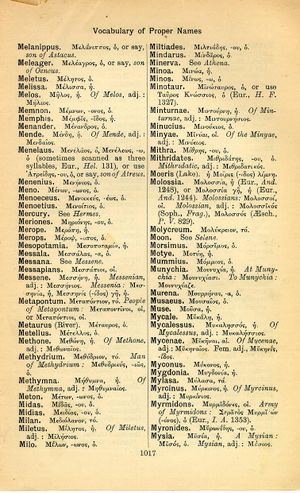Minerva: Difference between revisions
Θεὸς συνεργὸς πάντα ποιεῖ ῥᾳδίως → Rem facile quamvis peragit adiutor deus → Wirkt Gott als unser Partner, macht er alles leicht
(3) |
m (Text replacement - "(|thumb)\n(\|link=)" to "$1$2") |
||
| Line 1: | Line 1: | ||
{{WoodhouseENELnames | {{WoodhouseENELnames | ||
|Text=[[File:woodhouse_1017.jpg|thumb | |Text=[[File:woodhouse_1017.jpg|thumb|link={{filepath:woodhouse_1017.jpg}}]]See [[Athena]]. | ||
|link={{filepath:woodhouse_1017.jpg}}]]See [[Athena]]. | |||
}} | }} | ||
{{Lewis | {{Lewis | ||
Revision as of 17:01, 18 May 2020
English > Greek (Woodhouse)
See Athena.
Latin > English (Lewis & Short)
Mĭnerva: (old orthogr. Menerva, like magester, leber, etc., acc. to Quint. 1, 4, 17), ae, f. from the root men, whence mens, memini, moneo, etc.;
v. infra,
I a Roman goddess, identified with the Grecian Pallas Athene, the daughter of Zeus, and the goddess of wisdom, of sense and reflection, of the arts and sciences, of poetry, and of spinning and weaving: Minerva dicta, quod bene moneat. Hanc enim pagani pro sapientiā ponebant; Cornificius vero, quod fingatur pingaturque minitans armis, eandem dictam putat, Paul. ex Fest. p. 123 Müll.; cf. Cic. N. D. 1, 30, 180; 3, 23, 59; Varr. L. L. 5, § 74 Müll.: daedala, Enn. ap. Paul. ex Fest. s. v. daedalam, p. 68: Minerva nostra, custos urbis, Cic. Fam. 12, 25, 1: Minerva Iliensis, Ulp. Fragm. 22, 6: Aristoteles ... Minervam esse Lunam probabilibus argumentis demonstrat, Arn. 3, 31.—Prov.: pingui or crassā Minervā aliquid facere, without art, skill, or learning, plainly, rudely, Col. 1 praef. § 33; Cic. Lael 5, 19: rusticus crassā Minervā, Hor. S. 2, 2, 3: invitā Minervā, contrary to the bent of one's genius or natural abilities, against the grain, Hor. A. P. 385: quia nihil decet invitā, ut aiunt, Minervā, id est adversante et repugnante naturā, Cic. Off. 1, 31, 301: sus Minervam (docet), a stupid man will instruct a wise one, Cic. Ac. 1, 5, 18: omnis Minervae homo, jack - of - alltrades, Petr. 43, 8: MINERVA MEDICA, i. e. medicina, the goddess of health, Inscr Rein. 11, 81: fecit ex ebore aeque Minervam, a statue of Minerva, Plin. 34, 8, 19, § 54. —Transf.
A A working in wool, spinning and weaving: tolerare colo vitam tenuique Minervā ( = telā, lanificio), Verg. A. 8, 409; Ov. M. 4, 33; Prop. 2, 9, 5.—
B To form the name of a place.
1 Minervae Arx, v. Minervius, II. B.—
2 Minervae Promontorium, a promontory in Campania, to the south-east of Surrentum, the abode of the Sirens, now Punta della Capanella, Liv. 40, 18, 8; Ov. M. 15, 709.
Latin > French (Gaffiot 2016)
Mĭnerva⁹ (arch. Mĕnerva, cf. Quint. 1, 4, 17 ), æ, f., Minerve, [identifiée avec Pallas des Grecs, fille de Jupiter] : invita Minerva Cic. Off. 1, 110, malgré Minerve, malgré les dispositions naturelles ; pingui Minerva Cic. Læl. 19 ; crassa Minerva Hor. S. 2, 2, 3, avec le gros bon sens || travail de la laine : Virg. En. 8, 409 || Minervæ promunturium Liv. 40, 18, 8, promontoire de Minerve [en Campanie].
Latin > German (Georges)
Minerva, ae, f. (etrusk. Menerfa od. Meurfa), eine römische Gottheit, identitch mit der griechischen Ἀθήνη, Tochter des Zeus, Göttin der Weisheit, des Verstandes u. Nachdenkens, der Künste u. Wissenschaften (des Spinnens, Webens, der Poesie usw.), auch des Krieges, insofern er mit Einsicht geführt wird, Erfinderin des Öls u. der Bearbeitung der Wolle usw., Varro LL. 5, 74. Cic. de nat. deor. 3, 53 u. 55. Ov. fast. 3, 815 sqq.: Minerva medica, Göttin der Heilkunst, Corp. inscr. Lat. 6, 10133. – sprichw., crassā Minervā od. pingui, ut aiunt, Minervā, von od. mit derbem, schlichtem Hausverstande, Hor. sat. 2, 2, 3. Cic. de amic. 19. Colum. 1. praef. 33: sus Minervam (docet), wenn ein Dummer einen Klugen belehren will, Cic. Acad. 1, 18: invitā Minervā alqd dicere, facere etc., ohne Geschick, ohne Beruf, Cic. de off. 1, 110. Hor. de art. poët. 385: non invitā Minervā, Cic. ep. 12, 25, 1: omnis Minervae homo, er war in allen Sätteln gerecht, er trieb's in jeder Weise, Petron. 43, 8. – meton. (poet.) = Wollarbeit (Spinnen, Weben usw.), Verg. Aen. 8, 409. Prop. 2, 9, 5 u. 4, 5, 23. Hor. carm. 3, 12, 5. Arnob. 5, 45. – / arch. Genet. Minerves, Fasti Philoc. im Corp. inscr. Lat. 12. p. 260. – Nbf. Menerva, Quint. 1, 4, 17. Corp. inscr. Lat. 1, 1457; 14, 4105: Dat. Menervai, Corp. inscr. Lat. 1, 1462. Dav.: a) Minervālis, e, die Mi nerva (d.i. Gelehrsamkeit u. Verstand) betreffend, artes, Tert. de spect. 11: M. munus = minerval (w. s.), Hieron. in epist. ad Ephes. 6, 4: magister M., Vorsteher des Minervadienstes, Corp. inscr. Lat. 5, 7462 u. 7565. – Plur. subst., Minervālia, ium, n., Festlichkeiten zu Ehren der Minerva, Serg. comm. in Donat. 434, 32 K. – b) Minervius, a, um, minervisch, cives Minervii, v. den Athenern, Arnob.: nomen, der Minerva, Arnob. – subst., Minervium, iī, n., α) ein Tempel der Minerva, Varro LL. 5, 47. Arnob. 6, 6. – β) Stadt u. Burg (arx Minervae, Verg. Aen. 3, 531) mit einem alten, ehemals reichen Tempel der Minerva, südl. von Hydruntum in Kalabrien, Seehafen, ältester Sitz der Salentiner, von den Römern 125 v. Chr. kolonisiert, j. Castro, mit dem Hafen Porto Badisco, Liv. 45, 16, 5. Vell. 1, 15, 4.
Latin > English
Minerva Minervae N F :: Minerva, Roman goddess of wisdom

